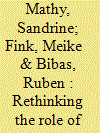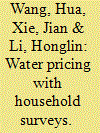| Srl | Item |
| 1 |
ID:
137690


|
|
|
|
|
| Summary/Abstract |
This article considers the usefulness of low-carbon scenarios in public decision-making. They may be useful as a product-oriented trajectory. The scenarios on the agenda of the 2013 Energy Debate in France belong to this category. But a scenario may also be process-oriented, in the sense that its scripting process helps build consensus and a minimum level of agreement. We have scripted scenarios using a codevelopment method, involving about 40 stakeholders from the private and public sectors, and from the state: NGOs, consumer groups, trade unions, banks and local authorities. They selected policies they considered acceptable for achieving 75% greenhouse gases emission reductions in 2050. These policies were then integrated in the Imaclim-R-France technico-economic simulation model, as part of a high or moderate acceptability scenario. In the first case emissions were cut by between 58% and 72% by 2050; in the second case by between 68% and 81%, depending on the energy price assumptions. All these measures benefited jobs and economic growth, swiftly and durably cutting household spending on energy services. This offers a solid basis for gaining acceptability for low carbon trajectories; the process constitutes also a framework for consolidating collective learning centering on the acceptability of climate policies.
|
|
|
|
|
|
|
|
|
|
|
|
|
|
|
|
| 2 |
ID:
093848


|
|
|
|
|
| Publication |
2010.
|
| Summary/Abstract |
In determining domestic water prices, policy makers frequently need to use demand-side information rather than only rely on supply-side data as previously did, and household surveys are often conducted to collect information on the demand side. This paper presents a multiple bounded discrete choice (MBDC) survey model for collecting information about acceptability of different water prices by different types of households and estimating households' willingness to pay for water service improvement. The results obtained from MBDC surveys can be directly utilized in the development of water pricing and subsidy policies. An empirical MBDC study is conducted in Chongqing, China, where domestic water service quality was seriously inadequate, but financial resources were insufficient to improve the service quality. With a survey of 1500 households in five suburban districts in Chongqing Municipality, this study shows that a significant increase in water price is economically feasible as long as the poorest households are properly subsidized. The analysis also indicates that the order in which hypothetical prices are presented to the respondents with the MBDC method can systematically affect the answers and should be taken into account when designing such survey instruments.
|
|
|
|
|
|
|
|
|
|
|
|
|
|
|
|